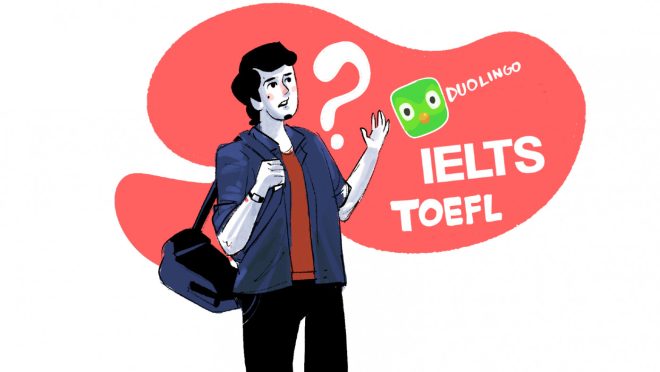Is the Duolingo English Test a good substitute for IELTS?
Is the Duolingo English Test a good substitute for IELTS?

Protiva Tasnim got enrolled in a master’s program at one of the most renowned universities in Europe in 2019. For her visa application, IELTS was mandatory, and she did not have much time to prepare for the test.
She found Duolingo, an app-based language learning platform, quite handy, and started learning vocabulary through the app and got herself ready for the test.
“I learnt both French and English through the app. Back then, Duolingo English Test also was an option, but not any of the universities I applied to would accept that. So I really did not have any other option than IELTS. But, the Duolingo app has unique features and clear structures, making it a reliable place to learn new languages or sharpen your skills,” she said.
Moreover, Protiva liked Duolingo’s user-friendly layout, and the “streak” feature, which motivated her to keep going, by tracking the number of days she had taken to reach her point goal.
Fast forward three years, Duolingo English Test (DET) has become a well-structured proficiency test for international students and is accepted by over 4,000 institutions around the world. In 2021, Ireland became the first government to officially accept the Duolingo English Test in visa applications.
Sharmishtha Saha, a graduate of Delhi University, sat for IELTS in 2018, but her score expired before she began applying to universities in 2020. She hardly had time to resit the test. Instead, she decided to take the DET test at home.
“IELTS and DET are completely different tests with different structures, but the essence is the same. It is all about your grasp of the language. Since I had already taken the IELTS before, I knew the drill. The DET is a hassle-free, uncomplicated test, and anyone can do it at home,” she said.
With a score of 130, she got into the University of Buckingham. Duolingo scores are reported on a scale from 10 – 160. Each certificate has a unique, secure link and subscores measure your proficiency in specific areas.In a conversation with TBS, Sophie Wodzak, Research Communications Specialist, Duolingo, shared that in recent years, test-taker numbers in India have increased rapidly. India being a vast country, the remote areas and states do not have enough Secure English Language Test (SELT) centres [accepted by the UK] through which students can easily sit a language test.
Even though Duolingo launched the DET in 2016, it only started gaining popularity during the onset of the Covid-19 pandemic.
The test is an Access Program, which provides fee waivers to high-achieving, low-income students around the world. DET appeared handy during the pandemic when going out and sitting for a test was difficult.
Besides English, people enjoyed learning other languages like French, Spanish, German etc., at that time.
Is DET tougher than IELTS?
Apurba Opu, a graduate of North South University, took the DET in 2020 and scored 120. But the universities he wanted to get into were accepting only a 130 score.
“At first glance, the DET seemed the best option. It cost me only Tk5,000 to take the test, whereas the IELTS fee was around Tk15,000 back then. DET curricula are easy and user-friendly, I must say, but scoring 130 felt difficult to me. Moreover, with IELTS, you have a bigger window of getting acceptance as more than 10,000 universities are accepting it,” he said.
Later, Opu sat for IELTS and got a band 7.5. He even got accepted by York University.
A Duolingo score ranging from 115-120 is equivalent to an IELTS score of 7 whereas 135-140 weights band 8. The candidate will get the Duolingo Test results within 48 hours, whereas the IELTS result takes 3 to 13 days to process.
While IELTS Academic is designed explicitly for educational purposes, DET was initially designed as a general proficiency test. However, some recent Duolingo publications have stated that its primary purpose is for admissions decisions.
Opu thinks universities give an upper hand to IELTS scores since it has been in the system for a very long time. However, no data supports Opu’s statement.
When asked about this potential prejudice, Wodzack said, “We are not directly involved in the admission process and cannot really say how the final selection is made. But if a university has partnered with us and accepted the DET, we do not see any reason that can lead the discrimination.”
Why hasn’t DET taken off in Bangladesh yet?
NA Siddique, CEO & Co-Founder of Edroll Education, believes that the reason why DET is not very popular in Bangladesh is the lack of branding and students’ pre-existing prejudices.
“IELTS has been in the system for a very long time now. The materials for the test are widely available and, most importantly, the British Council, the owner of IELTS, is a well-established name in the country.
On the other hand, Duolingo is a US-based educational technology company which has not been institutionalised in the country yet,” he said.
Wodzack shared that Duolingo has already become very popular in the neighbouring country India, and in the coming days, they have plans to do necessary branding in Bangladesh.
Other than Duolingo, there are many different language learning apps to choose from, so there’s likely a program that best suits your learning style and schedule. These apps are also economical, especially when compared with formal schooling or tutoring with a language expert.
Many have speech recognition, which is key to ensuring you have proper pronunciation. Others offer several language options, which is ideal when you want to pick up multiple languages.


